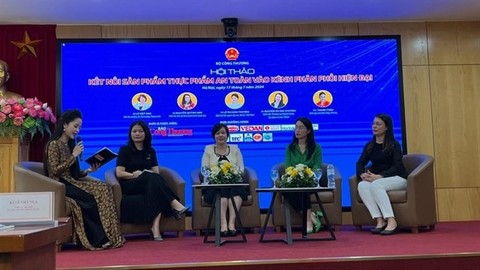
A workshop on connecting safe food products to modern distribution channels is held by the Ministry of Industry and Trade in Hà Nội on July 17. — Photo bnews.vn
Consumption of safe food products at modern retail channels is being promoted as more and more Vietnamese customers choose products sold within malls and supermarkets.
At present, modern retail systems in Việt Nam account for about 25 per cent of total retail sales, with a strong growth rate at 11.8 per cent each year.
Most goods in these modern distribution channels are controlled in terms of quality, design and price. They have more professional distribution and logistics systems than traditional markets, so the quality of goods is guaranteed.
Nguyễn Tiến Cường, deputy Editor-in-Chief of the Công Thương (Industry and Trade) newspaper, released this information at a workshop on connecting safe food products to modern distribution channels held by the Ministry of Industry and Trade in Hà Nội on July 17.
According to Cường, the connection between supply and demand of safe agricultural and food products continues to be supported by authorities, localities and businesses.
As one of the key food enterprises, a representative of CP Vietnam Livestock Joint Stock Company said with many years of experience in the field of agriculture and food, the company has modern livestock farms, a closed production system from breed to table and animal feed factories with advanced technology, ensuring quality and safety of products.
In addition, the company has also had an advanced quality management system, international certifications such as ISO 22000 and HACCP and a reputable brand.
According to the Ministry of Industry and Trade (MoIT), Việt Nam has over 1,167 supermarkets, 254 shopping centres and many systems of modern convenience stores in large cities, such as Big C & Go System, Co.op mart and Mega Market.
This is a positive factor for incorporating safe food products of CP Việt Nam to the modern distribution channels, according to the representative.
However, the representative said, in the future, MoIT needs to improve the effectiveness of inspection and supervision on food safety and support the food businesses in building a safe food production environment, meeting increasing demand for safe food for customers.
Park Chang Lyul, chief operating officer of LOTTE Mart Vietnam said in the past years, LOTTE Mart has participated in many programmes on connection with domestic manufacturers to increase Vietnamese goods at its system of 16 supermarkets in Việt Nam. Fresh products sold at the LOTTE Mart must meet VietGAP and GlobalGAP standards and must undergo a strict quality inspection process at all stages.
All items supplied to LOTTE Mart meet the quality standards and undergo a control process of product quality before reaching customers.
According to Park Chang Lyul, Việt Nam is an important market of Korean LOTTE Group. One of LOTTE's important strategies is development of domestic products at the distribution system to bring high quality goods at reasonable prices to the consumers.
Therefore, the group will constantly look for domestic eligible suppliers to diversify quality and safe food products.
He also emphasised that the domestic suppliers should pay attention to documents relating to product quality certification and operating certification, as well as learn about the retail system's goods delivery process.
Small and medium-sized suppliers are often lacking or do not comply with standards, making the review of any legal documents difficult and time consuming. Therefore, they need to have legal documents such as certificate on meeting food hygiene and safety conditions and product testing results, and comply with regulations on safe products, such as labeling regulations, he said.
In addition, LOTTE Mart representative said that the domestic suppliers' product packaging design has been improved in recent years, but it has not really kept pace with changes in the market.
Finally, to attract consumers, they need to ensure uniformity of products in terms of quality, appearance or other features, have enough supply and keep fresh of products during transporting to LOTTE Mart supermarket.
Many suppliers have difficulty in ensuring delivery time and enough goods, or have goods not meeting delivery conditions. He believes that if the domestic suppliers can improve the above issues, the path to the domestic products to modern supermarket systems like LOTTE Mart will open.
Lê Thị Hà, head of the E-commerce Activities Management Division, Department of E-Commerce and Digital Economy, MoIT, said that e-commerce along with the strong development of technology has changed shopping methods of Vietnamese consumers.
To manage food safety in e-commerce, Hà proposed the Ministry of Health complete a national database system on food safety and allow State management agencies overseeing the food safety field to connect and use the database, aiming at enhancing food safety management in cyberspace.
In addition, according to Hà, it is necessary to strengthen coordination in exchanging information between the department and relevant units such as the General Department of Market Management, the Police Department and the Food Safety Department, to fight against trading counterfeit goods, goods of unknown origin and goods infringing upon intellectual property rights in the food industry on the e-commerce platforms.
At the workshop, Lê Việt Nga, deputy director of MoIT's Domestic Market Department said the national action plan on a transparent, responsible and sustainable food systems, including sustainable development, food safety and green consumption, needs to be continued.
Nga said that MoIT's will focus on building a green distribution system and transform and develop wholesale markets into logistics centres to meet a transparent and sustainable food distribution system.
The ministry will also have development of e-commerce towards transparency and sustainability and focus on improving businesses' awareness on tracing origins, ensuring food safety and applying new technology in food production. — VNS